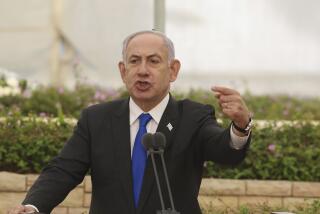Bosnian Serbs Balk Over Artillery for 4th Day : Balkans: Relatively few weapons have come under U.N. control thus far. More warnings to both sides are expected.
- Share via
WASHINGTON — Bosnian Serb soldiers around Sarajevo continued to balk Tuesday at withdrawing artillery or turning it over to U.N. peacekeeping troops, marking the fourth day in a row they have essentially defied a NATO order to surrender their heavy weapons.
Although U.S. and U.N. officials declined to provide specific figures, intelligence sources showed the total number of Serbian artillery pieces under U.N. control as of late Tuesday at only 33, with an additional seven such weapons turned over to U.N. commanders by Bosnian Muslims.
The tally was expected to bring renewed warnings to both sides. The Serbs are thought to have at least 200 artillery pieces in the area, and U.S. and NATO officials have said that any not relinquished by late Sunday will be subject to air strikes.
Separately Tuesday, U.S. and U.N. officials moved to counter reports of a split between them over what the Serbs actually must do to meet North Atlantic Treaty Organization demands to place their weapons under the control of U.N. forces in Sarajevo. After discussions, U.S. and U.N. officials said the two sides now see eye to eye over how to enforce the NATO ultimatum.
U.S. Navy Adm. Jeremy Boorda, the NATO commander who would be in charge of any air strikes, said Tuesday that the ultimatum requires only that the weapons be made so they “cannot be used.” And he said U.N. officials are following the same standard.
The ultimatum NATO issued last week initially demanded that the Serbs either move their weapons outside a 12-mile exclusion zone around Sarajevo or turn them over to U.N. forces in Sarajevo. They also set a deadline of 1 a.m. Feb. 21 Sarajevo time.
On Monday, however, U.N. officials dismissed the Feb. 21 date as “a NATO deadline” not binding on the United Nations and said they do not plan to insist that the Serbs move every weapon.
The apparent dispute had threatened to undermine the entire demilitarization effort. Some analysts suggested the Serbs were moving so slowly in part because they believe the allies are in disarray.
But State Department spokesman Mike McCurry told reporters Tuesday that U.N. control would mean “that the U.N. has got those weapons, and they’ve got the weapons in a condition and under a status in which they can’t be used to shell Sarajevo.”
U.S. and U.N. officials talked privately Tuesday about details of the understanding, which was based on recommendations by the Joint Chiefs of Staff. U.S. Army Gen. George Joulwan, NATO military commander, is expected to fly to Zagreb, the Croatian capital, later this week.
Although the Pentagon declined to provide any more details, military analysts familiar with the discussions said U.N. commanders are likely to set up five local “containment zones” around Sarajevo to store Serbian artillery.
They said one reason for the Serbs’ refusal to move faster was fear that if they removed their artillery from the Sarajevo area, they could no longer ward off any attack by Bosnian Muslim forces.
The tally of 200 for the number of heavy weapons that the Serbs have in the Sarajevo area is a Pentagon estimate. U.N. spokesmen in Sarajevo have been using a figure of 500 for the same region, but U.S. officials say they do not know how that number was obtained.
Also Tuesday, special U.S. envoy to Bosnia Charles Redman and Russian Deputy Foreign Minister Vitaly Churkin, both visiting Sarajevo, began efforts to persuade the warring factions to avert any escalation of the war and seek a peace accord.
“The ultimatum is there,” Redman said, “but at the same time our intention is . . . to try to use that momentum to turn everybody’s attention toward a negotiated solution.” Churkin also urged new talks, expressing hopes for a “peaceful military disengagement.”
At the same time, however, signals from Serbian leaders continued to be mixed.
The Associated Press reported that Bosnian Serb leader Radovan Karadzic had told reporters on Serb-held Mt. Jahorina outside Sarajevo that the Serbs had “agreed on efficient control of the weaponry” and “are ready to regroup it to make it easier for the U.N. to control it.”
But Gen. Ratko Mladic, the Bosnian Serb military commander, said later that “there will be no withdrawal of the Serb artillery.”
Karadzic said later that he expected the Serbian military to issue a clarifying statement sometime today or Thursday, but it was not immediately clear whether Mladic would change his mind.
U.N. officials announced Tuesday that they are transferring more peacekeeping troops to Sarajevo to help monitor compliance with the NATO ultimatum.
Partly to give the Serbs some way to save face if they decide to comply with U.N. demands, U.S. and U.N. officials said they no longer will announce how many weapons have been withdrawn or turned over to U.N. forces.
Officials again sought to ward off any impression that the allies will automatically start bombing at 1 a.m. Sarajevo time next Tuesday if the NATO ultimatum has not been met. They said the deadline authorizes NATO to begin such strikes but does not actually trigger them. That decision would be made by U.N. officials in Bosnia.
* YELTSIN WARNING: Russia demands to be consulted before any attack on Serbs. A7
More to Read
Sign up for Essential California
The most important California stories and recommendations in your inbox every morning.
You may occasionally receive promotional content from the Los Angeles Times.













